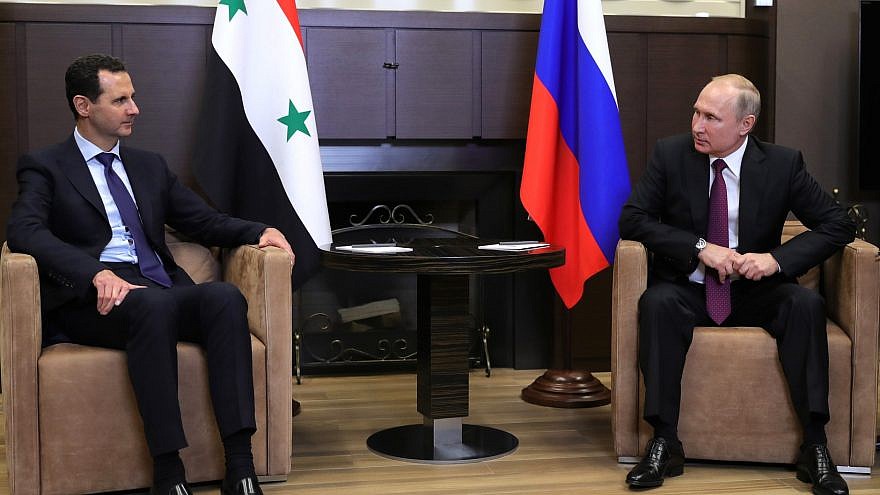A Russian Defense Ministry announcement on Monday regarding joint Russian and Syrian air-force patrol missions along the Golan Heights—in southern Syria near Israel and over the Euphrates River in northern Syria—represents significant messaging from Moscow over its intentions, Israeli observers have said.
According to the Russian Defense Ministry, Russian jets took off from Hmeimim (Khmeimim) Airbase near Latakia on the Syrian western coastline and were joined by Syrian jets taking off from bases outside Damascus. Russian President Vladimir Putin signed an agreement in 2017 with President Bashar Assad of Syria giving the Russian military access Hmeimim Airbase for an additional 50 years.
Brig. Gen. (res.) Yossi Kuperwasser, former head of the Israel Defense Forces’ Military Intelligence Directorate’s Research Division, told JNS that assuming the joint flights occurred, they represent a route tracing Syria’s borders and that this “is a message that sharpens the Assad regime’s sovereignty over the area once called Syria.”
Kuperwasser, director of the Project on Regional Middle East Developments at the Jerusalem Center for Public Affairs, added that the message represents a beefing up of Russian support to the Syrian regime and its claim to sovereignty.
He said the joint flights, which approached Syria’s border with Iraq as well, could also be seen as a message to the United States, according to which, “Russia is back.”
“Russia’s message is that it is good to rely on it—that it is a serious country that supports its friends and which does not hesitate to activate for that purpose,” said Kuperwasser. “This can be seen in a wider context going beyond the Israeli context. It could also be tied to Ukraine, where the message of not being afraid to activate force and offering ‘real support for friends while others are not reliable allies’ could have an impact.”
‘A very delicate balance’
Maj. Gen. (res.) Eitan Ben Eliyahu, former Israeli Air Force Commander from 1996 to 2000, told JNS that Iranian activity in Syria and the Israeli strikes that it provokes undermine Assad’s sovereignty. “Hence, I see this is as a demonstration of coordinated interests between Russia and Syria,” he said.
Russia is telling Israel that it has good relations with it and understands its interests, but that Israel cannot harm Russia’s own interest of completing Assad’s sovereignty in Syria, he stated.
This is part of a trend that has slowly been developing in Syria, in which the balance of power between the Assad regime, Iran, Russia and Israel has been changing, “and the orchestrator of this balance is Putin,” said the former air-force commander.
Putin is interested in “completing the hegemony that he is building in Syria through a puppet named Assad. So long as the Syrian war raged, he needed Iran,” said Ben Eliyahu.
That meant Russia was willing to accept the corridor that Iran built to Hezbollah in Lebanon and Iranian malign action against Israel as long as Iran was activating force to help defeat rebel forces that had threatened Assad.
“As time passes by and it becomes clear that Assad is consolidating his takeover, the Russian interest of allowing Iran to be in Syria is decreasing,” added Ben Eliyahu. It is in Israel’s interest to allow Russia to push the Iranians out of Syria, he argued.
He noted that following the 2018 deadly downing of a Russian reconnaissance plane by Syrian air-defense batteries seeking to target Israeli jets, “a very delicate balance” has emerged in Syria, according to which Israel is mostly free to operate against Iranian targets in parts of Syria that are free of Russian forces and where no deconfliction is necessary.
Israel and Russia maintain a deconfliction hotline, which is used by both air forces to prevent unintended clashes in Syrian skies.
According to the Russian Defense Ministry, the recent joint patrol with Syria’s air force involved Russia’s Su-34 and Su-35 aircraft, and the A-50 early-warning and control aircraft, as well as Syria’s MiG-23 and MiG-29 planes, said the Tass Russian news agency.
“During the patrol mission, Syrian pilots controlled airspace and provided fighter cover, while Russian crews practiced attacks on ground targets,” the statement said. “These kind of joint missions will now take place on a regular basis,” added the Russian Defense Ministry.
‘More of a political statement’
Israel, for its part, “has to continue to push the Iranians out of Syria and to do this without conflicting with Russia,” said Ben Eliyahu. Ultimately, he determined, the current trends in Syria mean that Russian and Israeli interests are merging, based on the desire to expel Iran from Syria—a vital Israeli interest.
On the other hand, he cautioned that Russia is not yet ready to take an adversarial posture with Iran since this partnership, as well as Russia’s increasing cooperation with China, “helps it in its struggle against the U.S. and Europe,” he stated. “Hence, very delicate signals like this joint patrol are happening. They are part of a demand that if Israeli attacks occur, that they happen in more open areas of Syria.”
As Israel navigates this complex arena, as long as “the Iranians continue with weapons trafficking, we have no choice but to act against [them] in Syria and to act against them in other ways to stop their nuclear program,” said Ben Eliyahu.
Kuperwasser’s assessment was similar regarding how Israel should proceed, saying: “Israel should continue as normal in Syria. I don’t think the flights in the Golan Heights caused Israeli air defenses to stir. This is more of a political statement, which does not influence Israel’s ability to stop Iran and Hezbollah from consolidating their presence in the northern arena. The Russians also want to continue the logic of deconfliction with Israel.”


























